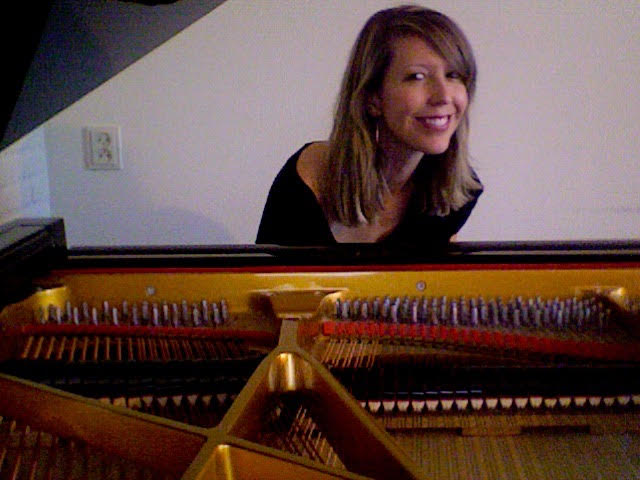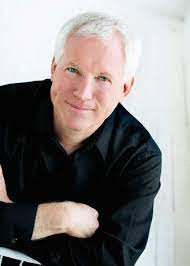We would like to thank Heather Hancock for this tribute to her teacher, John Salmon. As we continue the season of gratitude and giving, we pay tribute to piano teachers from around the country who are transforming the lives of their students. Students, parents, and colleagues are honoring piano teachers from their communities as part of the “Power of a Piano Teacher” campaign. We welcome you to celebrate your own teacher by sharing a tribute with us and donating to The Frances Clark Center.

Writing about someone whose significance continues to expand in the world and, in my own life, is a daunting task. Words seem too small! I can only hope that somehow, my black and white text might serve as a constellation guide, sharing some of my own admiration, wonder, and gratitude for someone who has been and continues to be such a luminous presence.
I first met Dr. John Salmon in 1991 at my audition at UNC-Greensboro. Auditions were being held in a small faculty studio, where no one was more than three feet away from anyone else, creating a heightened sense of exposure. As always, after playing, I felt incredibly vulnerable and had an acute desire to dissolve into the air along with the last note. I sat anticipating the familiar, awkward silence where, typically, there is no acknowledgement of what has just transpired, only the sound of judges, jurors, or faculty scribbling down their critique. But the silence never came. Instead, John eagerly piped up, saying, “What beautiful, heartfelt playing! What are your SAT scores?” I was so taken aback by his uninhibited enthusiasm that tears sprang to my eyes, and it took me a moment to respond. This was the last of my college auditions, and UNC-Greensboro was the only university on my audition roster. Every other school was a conservatory of music and honestly, UNCG had been my last preference. After my audition, John found me sitting on a bench in the School of Music and came right over and THANKED ME!!
Weeks later, as I was trying to make my final decision about where I would attend, I kept coming back to John’s incredibly generous, kind, and encouraging response to my audition. I didn’t have the language for it then. I just felt drawn to his sincerity and willingness to engage, so unconstrained by the power dynamics and nit-picking critiques that seemed a sad but predictable norm of classical piano culture. John’s warmth, immediate encouragement, and passion for music were unique. I had the privilege of studying with him for four years at UNCG, where I got to behold his rare, multi-layered brilliance and captivating personality in action. I watched him as he tirelessly birthed Focus on Piano Literature, an annual symposium featuring world class performing artists and pedagogues from around the globe. I heard several phone conversations between he and Dave Brubeck, saw letters he exchanged with Kapustin, and routinely attended his dazzling performances, which often showcased his duo virtuosities as both a jazz and classical pianist.

My lessons were always a rich synthesis of ideas and inspirations; we talked about politics, religion, philosophy, ethics, recordings, performances, art exhibits, languages, and so much more. John was eager to engage in whatever was engaging to me. He understood that, for some of us, there is no separating artistry and pianism from the rest of life, that music and its making are not confined to a field of study. Music, like air, is an essential element of being human and therefore relevant to everything. Before social justice initiatives and strides toward equity, diversity, and inclusion were topics of inquiry in academia, I watched John break racist barriers, advocating for and collaborating with musicians of every color, spanning the gamut of musical genres. He understood the conditions of his own privilege and was using his music as a resource for making things better. To me, this exemplifies a true artist; someone who views their craft as a continuous invitation to serve and better the world.
John and I have remained close friends for the last three decades and my respect and admiration have continued to grow. As a college student, I was aware of John’s brilliance and cherished his expertise, kindness, and generous guidance. Now, having a broadened perspective of the world, I appreciate how rare John’s profound artistic and personal integrity are, and how these have imprinted on every aspect of my life. This is the power of a piano teacher, and now it is my turn to eagerly pipe up and say, “What beautiful, heartfelt teaching. THANK YOU!!!”
MORE ON THE POWER OF A PIANO TEACHER
- DISCOVERY PAGE: The Power of a Piano Teacher by Heather Smith
- DISCOVERY PAGE: The Joy of Giving by Heather Smith
- DISCOVERY PAGE: Thank you, Jane! by Sara Ernst
- DISCOVERY PAGE: She Really Took a Chance on Me by Asia Passmore
- DISCOVERY PAGE: A Symphony of Gratitude by Ricardo Pozenatto
- DISCOVERY PAGE: Honoring Amy Merkley and Irene Peery-Fox by Hyrum Arnesen
- DISCOVERY PAGE: Reflections on My Piano Teacher | Honoring Fern Davidson by Marvin Blickenstaff
- DISCOVERY PAGE: Every Student Has a Voice the World Needs to Hear | Honoring Carole Ann Kriewaldt by Leah Claiborne
- DISCOVERY PAGE: An Inspirational Force of Nature | Honoring Michelle Conda by Andrea McAlister
Not yet a subscriber? Join for only $7.99/mo or $36/yr.
As a Performing Artist, Pedagogue and Activist, Heather Hancock is passionate about the intersection of artistry and social justice. Currently, Heather is a DMA candidate (Piano Performance) at The University of Georgia where she is a Teaching Assistant. Her research explores solo piano works that directly engage social justice issues. As a collaborative pianist, Heather delights in exploring works by under represented composers as well as newly discovered and contemporary composers.